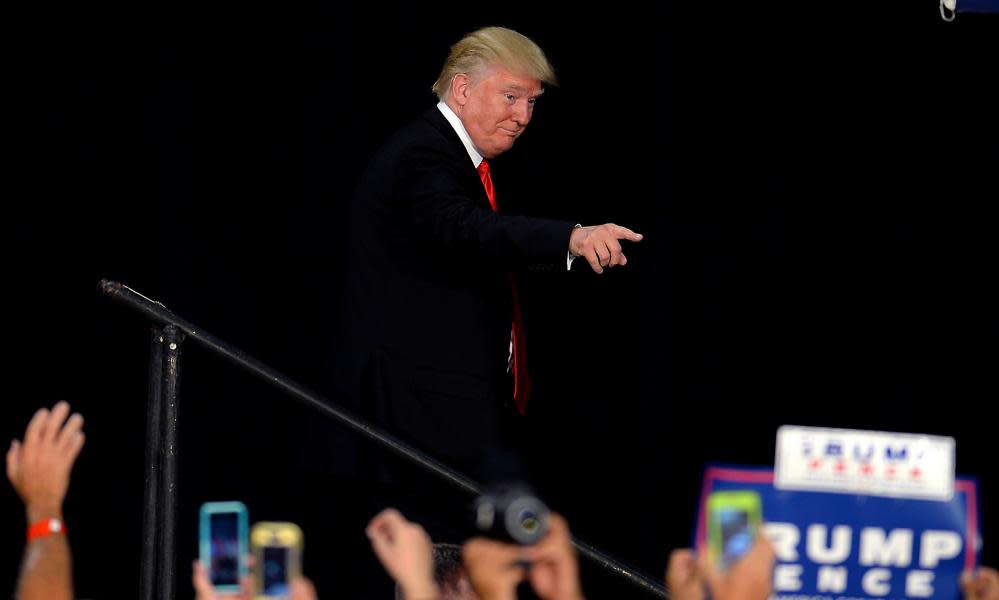DNC lawsuit against Trump campaign divides party – but could reveal key facts

By suing the Trump campaign, the Russian government and others, the Democratic National Committee has opened up a new front in a legal battle that is either a campaign for justice or a pitiable attempt to overturn the 2016 election result, depending on whom you ask.
Donald Trump’s 2020 campaign manager, Brad Parscale, branded the DNC action a “last-ditch effort to revive the witch-hunt with a lawsuit”.
Trump tweeted that it was “so funny, the Democrats have sued the Republicans for Winning”.
Even some Democrats have expressed reservations. “I think this sidebar lawsuit is not in the interest of the American people,” the US congresswoman Jackie Speier of San Francisco, who has a law degree, told CNN.
But the lawsuit is distinct in significant ways from parallel legal actions and – if it is not dismissed outright at an early stage – it could add significantly to public knowledge, at least, about Trump campaign activities and Russian election tampering, legal experts said.
“[It] might end up becoming a really, really powerful tool for the DNC to actually unearth new information,” Susan Hennessey, executive editor of the Lawfare blog and a senior fellow at the Brookings Institution, told PBS Newshour on Friday.
The DNC suit alleges that the Trump campaign was a racketeering enterprise engaged in an illegal conspiracy to influence the outcome of the election. Unlike parallel legal actions, the lawsuit names as defendants Donald Trump Jr and Jared Kushner, the president’s son-in-law and adviser.
While both men have been subject to grand jury subpoenas issued by the special counsel Robert Mueller, and Kushner sat for a private meeting with Mueller in November 2017, neither has been charged by Mueller, as far as is publicly known.
The brothers-in-law have separately denied any wrongdoing.
The DNC lawsuit could be seen as an outrider to Mueller’s investigation of alleged collusion between the Trump campaign and Russia and related matters, Hennessey told PBS.
“I think that they are fundamentally unrelated,” she said. “We don’t know much about the Mueller investigation. The DNC suit both relies on the Mueller investigation, because it uses some evidence that actually comes from those court filings, and it also gets quite a bit ahead – it is alleging this actual conspiracy [and] we haven’t seen Mueller make that showing.
“I think the best way to think about it is sort of parallel tracks, the same subject matter but not necessarily related.”
In a separate lawsuit filed in July 2017, three plaintiffs whose emails were hacked and disseminated in the cyber-attacks on the DNC accused the Trump campaign and Trump’s former adviser Roger Stone of an invasion of privacy. Stone had boasted of communications with Julian Assange of WikiLeaks, which published the emails.
A hearing on a motion to dismiss the suit, filed in US district court for the District of Columbia by the DNC donors Roy Cockrum and Eric Schoenberg, and the former DNC staffer Scott Comer, is scheduled for 17 May.
Writing last year on that lawsuit, Andrew Wright, a former White House associate counsel and a professor at Savannah Law School, concluded: “This is an extraordinary case in which discovery orders on the path to that proof could be as important to the public discourse as the outcome of the case itself.”
The same dynamic could hold in the DNC suit, Wright said in an email to the Guardian, with important information coming to light through judicial proceedings.
Hennessey, meanwhile, said: “This is an amazingly complex legal landscape.”

 Yahoo News
Yahoo News 
